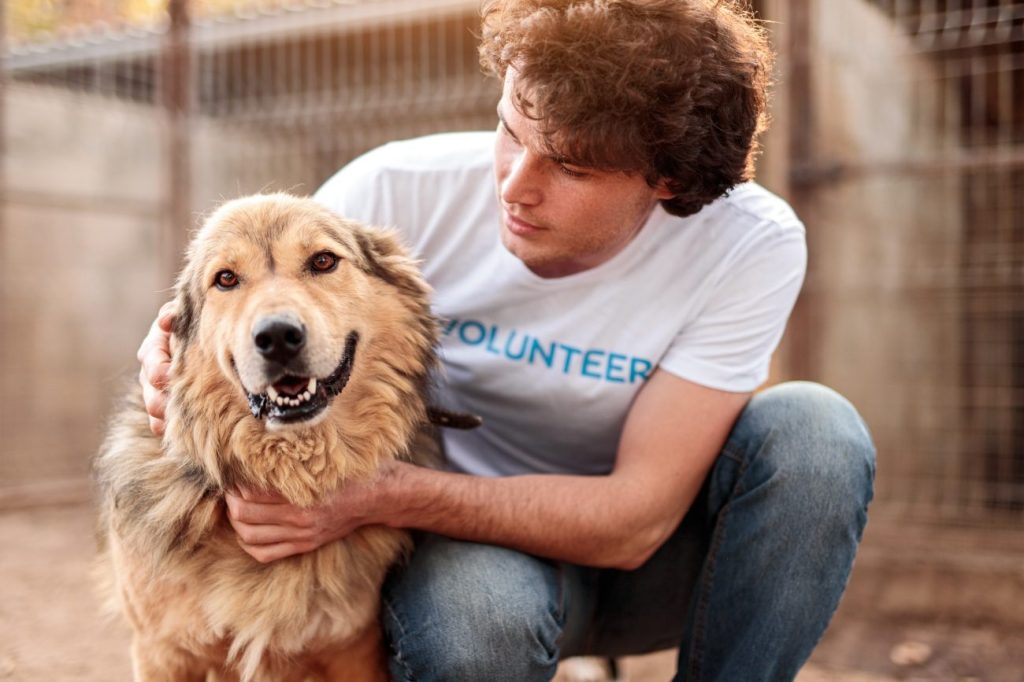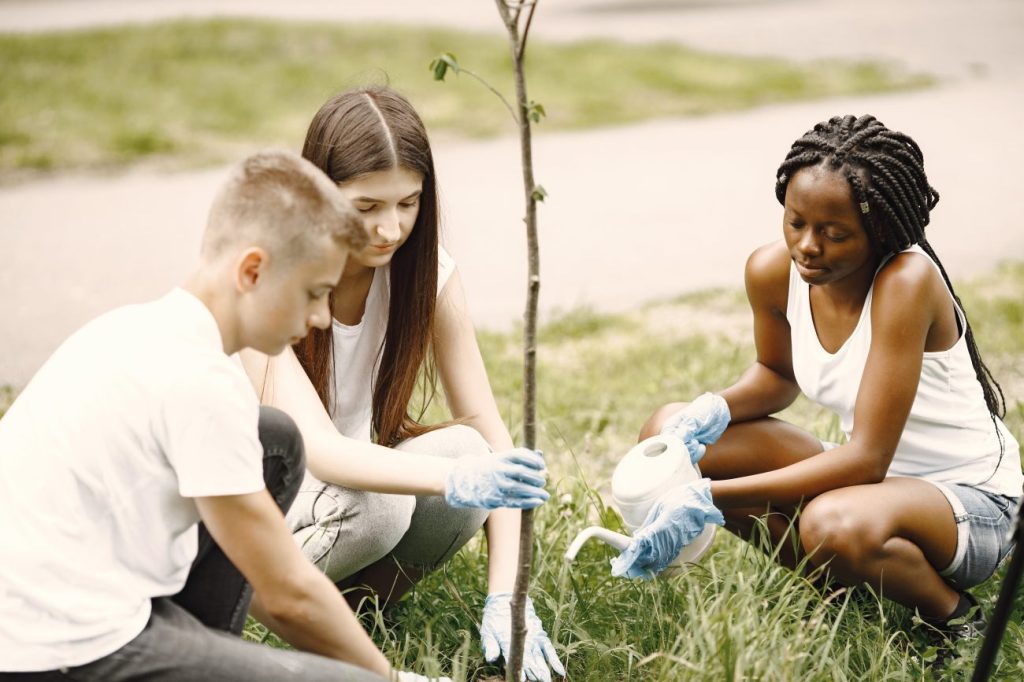Volunteering as a high school student is a great way to connect with people, build helpful life and career skills, and learn more about yourself. In this article, we share tips to help you figure out how to volunteer as a teen in Canada and where to find opportunities that fit your interests and future goals.
What are the benefits of volunteering?
Between school assignments, a part-time job, sports, and hanging out with friends, it may be hard to imagine adding volunteering to your already busy schedule. Whether you need volunteer hours to complete high school, or just want to make a difference, there are several benefits to taking the time to help others.
1. Gain experience
Volunteering can help you prepare for a future job or internship opportunity. Skills like communication, planning, teamwork, and problem solving are transferable skills that can be useful, regardless of what work you end up doing in the future. Developing these skills can also build your resume and help you stand out from other applicants.
Volunteering also gives you the opportunity to meet people from different career paths or backgrounds who share similar interests. Those interactions could be the start of finding a mentor or a new friend.
2. Explore your interests
Since volunteer opportunities are available across different industries, it can be a good way to explore different careers or interests. If you want to be a vet, consider volunteering at an animal shelter. Or if you see a career in the arts, volunteer for a film festival. While you won’t get paid, you’ll gain a better understanding of whether a career is right for you, while doing something you’re passionate about.
3. Make a difference
As a volunteer, you have the opportunity to build relationships with different people in your community or an organization you believe in and make a direct impact. It could be as simple as sorting out cans at your local food bank, planting trees, or being a reading buddy to a younger child. These small acts can make a big difference!
4. Volunteering is good for you
As an activity that involves a lot of socializing, volunteering helps you connect with people. One benefit of this is increased dopamine levels (which over time can lead to reduced stress). Volunteer activity that allows you to work outdoors could also potentially make you more active, and help boost your immunity and improve your breathing.
Read more: What teens need to know about getting an internship in Canada.
Do you need volunteer hours to graduate high school in Canada?
Depending on where you live in Canada, high school students are required to complete between 25 to 40 hours of volunteer hours before they graduate. Not all volunteering is equal, which is why it’s important to make sure that the volunteer work you do is eligible for volunteer hours with your school board. This checklist created by the Toronto District School Board lists some ineligible volunteer activities. Try to clarify this with a teacher at your school or the volunteer organizations you are applying to if you’re not sure.

| Province | Volunteer requirements |
| British Columbia | A minimum of 30 hours of paid, career preparation or volunteer community service is a graduation requirement for all BC secondary school students. |
| Manitoba | Students can complete 110 hours to obtain a full high school credit (1.0) or 55 hours for a half credit (0.5). |
| Newfoundland and Labrador | Senior high students are required to complete 30 hours of community contribution. |
| Ontario | Students are required to complete a minimum 40 hours of community involvement activities as part of the requirements for an Ontario Secondary School Diploma. |
| Prince Edward Island | Students are required to volunteer a minimum of 30 hours, up to a maximum of 100 hours. Students can accumulate volunteer hours as soon as they are in Grade 11. |
| Quebec | High school students must complete a minimum of 30 hours of community service to graduate. |
| Saskatchewan | Students in Grades 10 to 12 can receive a high school credit for volunteering 100 hours of their personal time. |

How do high school students find volunteer opportunities?
You want to complete your volunteer hours, but perhaps you feel overwhelmed figuring out how to start. To make the process easier we recommend breaking it down into three simple steps:
1. Reflect
When finding a volunteer opportunity, a good place to start is by narrowing down what you are passionate about and what type of impact you want to make. Take a few minutes to write out what activities you’ve enjoyed in the past. Or brainstorm what activities you haven’t tried yet but would love to. These lists can help you figure out what you enjoy or what skills you can share as a volunteer. This self-assessment created by Volunteer Canada has a checklist of skills to help you.
2. Research
Now that you have a better idea of what kind of volunteer work you would like to do, you can start researching organizations where you can volunteer. A good place to start is by asking teachers, family members or friends if there are any organizations they would recommend. Volunteer Canada is also a great resource to help you start planning your volunteer journey.
3. Reach out
The final step of this process is to apply for different volunteer opportunities. If you are waiting to hear back from an organization or they are taking time to get back to you, consider following up with an email or phone call expressing your interest in volunteering with them.
Where to volunteer as a high school student
No matter what your interest or skill set, there’s likely a volunteer opportunity for you. We’ve highlighted a few places to start your search below. Volunteer Canada also lists organizations in different industries on their website. Since the pandemic, there are also more virtual volunteer opportunities available.
In your community
Check your community or town’s website or community centre website for volunteer opportunities. Some of these opportunities are often seasonal, so it’s a good idea to apply early if you’re looking for an opportunity during peak times like summer or spring.
Arts organizations
Ask about volunteer opportunities at museums, art galleries or independent arts organizations. Start by reaching out to arts organizations you are interested in. Many larger arts organizations will have a person who is responsible for volunteers, so reach out to them directly to see what sorts of opportunities might be available.
Sports and recreation
Volunteering with a sports organization or recreational centre is an awesome way to stay fit and complete your volunteer hours. Reach out to your local hockey team, YMCA or yoga studio near you to see if they might be looking for volunteers to help run their programs.

Environment
If you enjoy spending time outdoors, volunteering at an organization that supports the environment might be for you. Looking for opportunities at organizations like Nature Conservancy Canada is one way you can start searching for opportunities like this.
Read more: 10 climate change activists making a difference.
Although finding the right volunteer opportunity might feel overwhelming, donating your time has long-term benefits for both you and the people you help. Volunteering can also introduce you to industries you see yourself having a career in and build friendships. Regardless of where you decide to volunteer, this high school graduation requirement can feel less like a chore and more like a fulfilling experience.
Download the Mydoh app to help kids and teens build confidence to manage their money and grow to become financially independent.
This article offers general information only and is not intended as legal, financial or other professional advice. A professional advisor should be consulted regarding your specific situation. While the information presented is believed to be factual and current, its accuracy is not guaranteed and it should not be regarded as a complete analysis of the subjects discussed. All expressions of opinion reflect the judgment of the author(s) as of the date of publication and are subject to change. No endorsement of any third parties or their advice, opinions, information, products or services is expressly given or implied by Royal Bank of Canada or its affiliates.

















